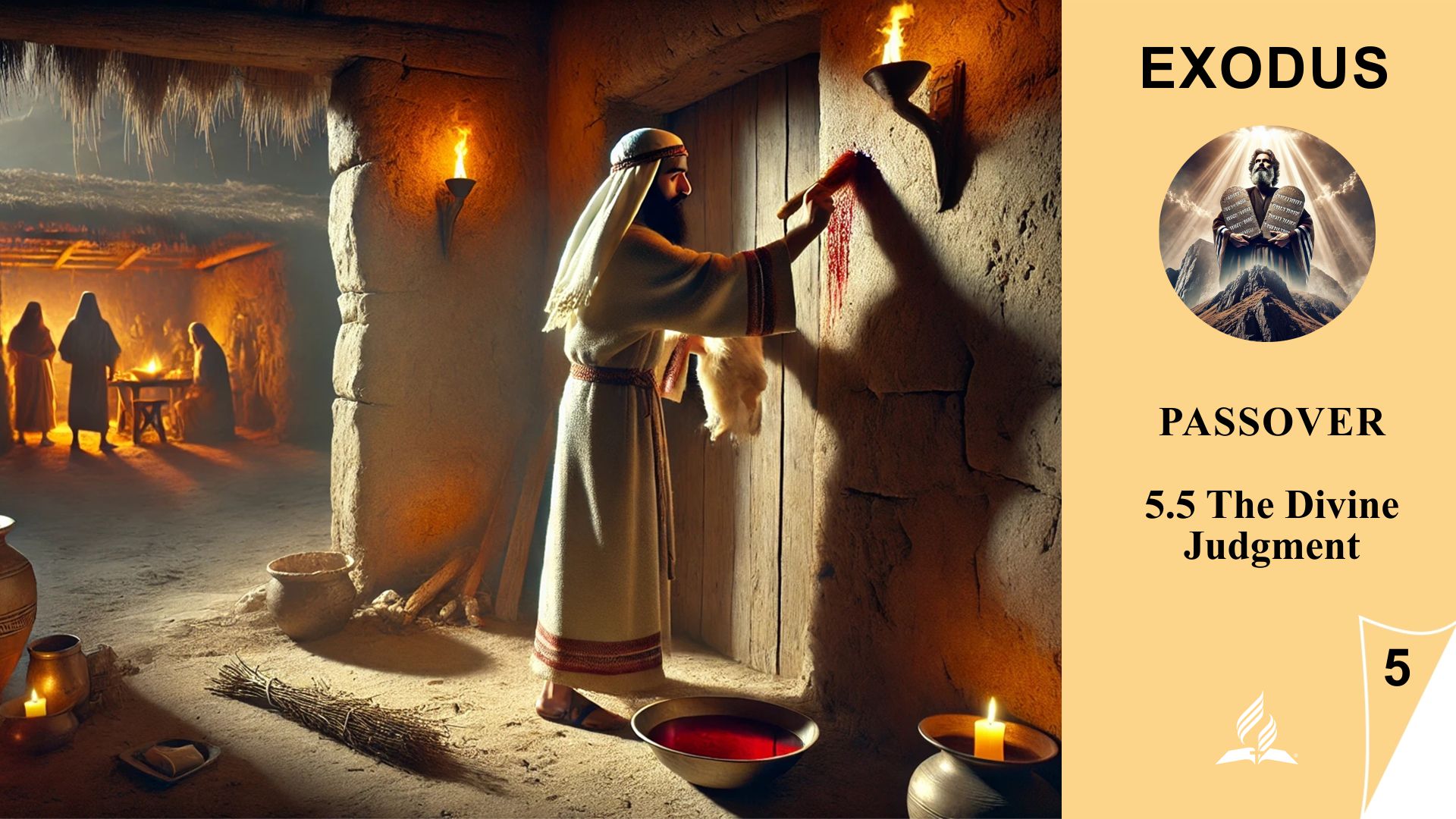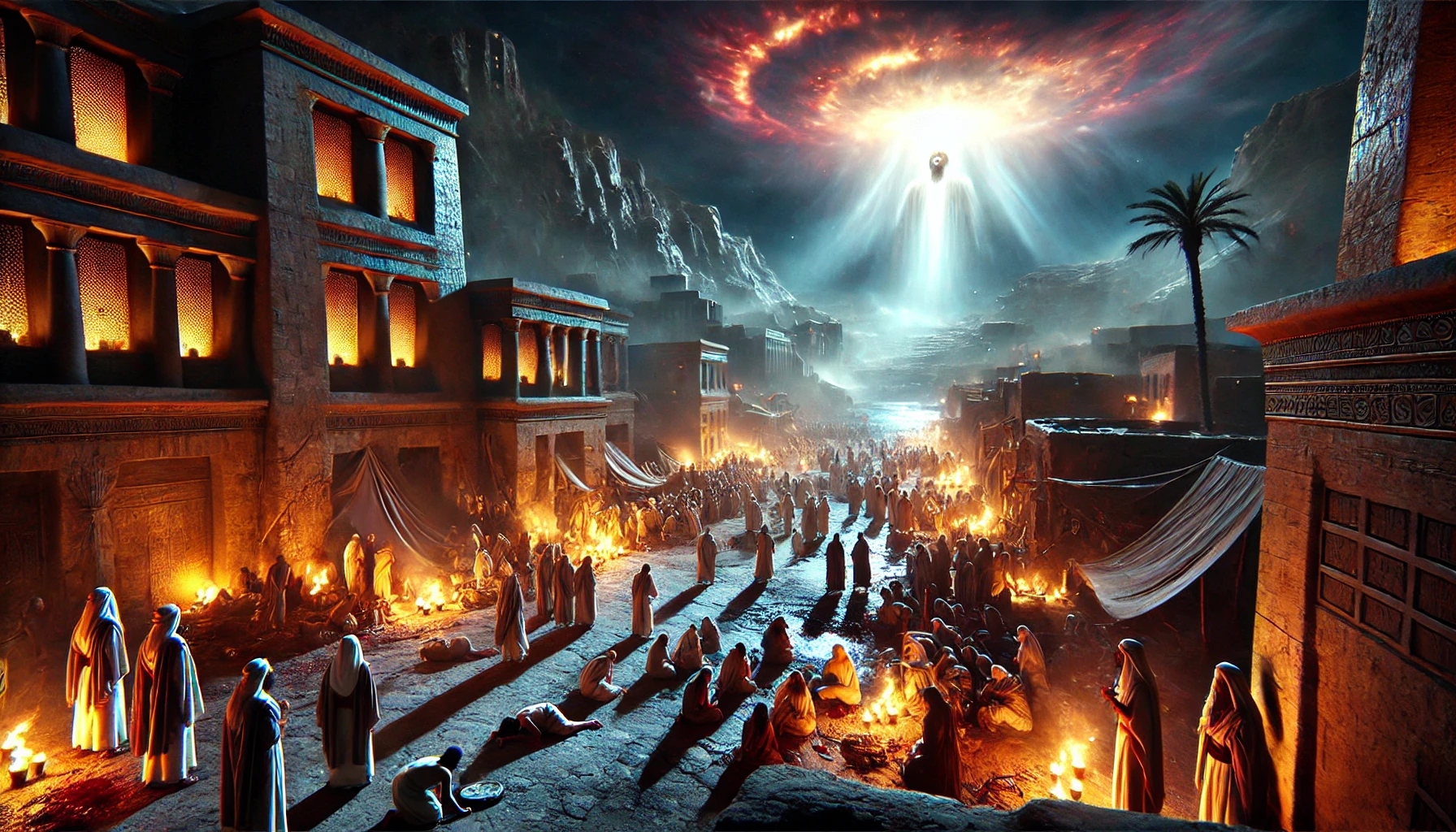

⛪ Lesson 5: Passover
📘 5.5 The Divine Judgment
✨ Divine Judgment – When Justice Is Revealed
………………………………………………………………….
🟦 Introduction
The tenth and final plague was the climax of God’s intervention against Egypt’s oppressive system. What began as a promise of liberation now finds its radical fulfillment: the Egyptian firstborn die – a deeply shocking but justified judgment.
Why did God strike the firstborn specifically? What does that tell us about justice, retribution – but also hope? And what does it mean for us today, in a world full of injustice, pain, and consequences?
This lesson brings us to a point where we begin to grasp the weight of sin and the depth of divine justice – and at the same time realize: salvation comes through the blood of a lamb.
………………………………………………………………….
📖 Bible Study: Exodus 12:29–30 + Hebrews 11:28
Theme: “The Judgment on the Firstborn – Final Consequence or Final Chance?”
Text Base: Exodus 12:29–30 / Hebrews 11:28 / Exodus 1:16–22 / Exodus 15:11 / Exodus 18:11
🔹 1. Historical and Biblical Context
The story of the ten plagues is not a myth or a fable – it is God’s direct confrontation with a system of oppression that defied life, freedom, and truth.
Pharaoh was more than just a man – he embodied a divinely legitimized system of power that enslaved his own people and others. The tenth plague was not only directed at Pharaoh himself, but at everything he represented:
-
Power without justice
-
Religion without truth
-
Progress without regard for life
God’s decision to strike the firstborn was not cruel – but consistent. It was the final step, after God had warned, waited, and called out nine times before.
🔹 2. Why the Firstborn?
In ancient Near Eastern culture, the firstborn carried the family’s legacy, identity, and hope. They symbolized:
-
The future of the family
-
The continuation of the lineage
-
The pride and status of the parents
In Egypt, this had religious implications:
-
Pharaoh’s son was considered divine
-
Goddesses like Isis, Heqet, and the god Min were seen as protectors of life, fertility, and children
So the tenth plague was:
-
A blow to Egypt’s religious foundations
-
An exposure of the gods’ powerlessness
-
A reflection of Egypt’s own sin – they had murdered Israel’s firstborn (see Exodus 1:16–22)
God’s judgment is never arbitrary – it is both mirror and response.
What a person sows, that will they also reap.
🔹 3. Passover as a Gift of Grace in the Midst of Judgment
God could have judged without warning.
But instead, He offers salvation – through a sacrifice, a lamb, through faith and obedience.
Passover was:
-
A sign of faith – not understanding saved them, but trusting did
-
A sign of separation – those who obeyed were under divine protection
-
A sign of redemption – not through effort, but through the lamb’s blood (Hebrews 11:28)
➤ Protection from destruction didn’t depend on origin, status, or knowledge – only on the blood.
Parallel to the gospel:
Jesus is our Passover Lamb (see 1 Corinthians 5:7).
Only His blood saves us from eternal judgment.
Yes, God judges – but He offers protection first.
🔹 4. The Character of God in Judgment
We must learn to see God not only as “loving” – but as holy, just, slow to anger, and rich in mercy.
God is no tyrant – but He is also not a passive observer.
In Exodus 12:29–30, we see:
-
God’s resolve – He acts when the time is right
-
God’s control – He chooses the target (firstborn), the time (midnight), the scope (all of Egypt)
-
God’s patience – He had warned them nine times before
-
God’s grace – He offered a way of salvation beforehand
God does not judge out of anger – but out of justice.
And His justice is never separate from His mercy.
🔹 5. Judgment as a Response to Systemic Sin
The tenth plague did not strike only individual sinners – but an entire system, which over generations had:
-
Killed children
-
Enslaved peoples
-
Ignored the voice of God
God’s judgment strikes structures – not just actions.
This is true today too:
-
Systems that destroy life (human trafficking, environmental abuse, exploitation)
-
Systems that suppress truth (propaganda, censorship, persecution)
-
Systems that prioritize power over people
God does not remain silent – at some point, He speaks through events, upheaval, and judgment.
🔹 6. What Does This Have to Do with Us?
The story of the ten plagues is not just history – it is prophecy.
Even today, there are modern-day Pharaohs – in politics, economics, ideology.
Even today, innocent blood cries out from the ground to God.
Even today, God offers protection – but not forever.
The real question is:
“Am I under the protection of the Lamb – or living in my own strength?”
🔹 7. The Deep Truth of Passover
God saves through substitution.
An innocent dies – so the guilty may live.
A lamb sheds its blood – so destruction passes by.
What happened literally in Egypt happens spiritually today:
Whoever trusts in Christ is no longer under condemnation – but under grace.
🔹 8. Spiritual Lessons for Today
-
Judgment is real – but never without warning
-
Faith is shown through obedience
-
Our decisions deeply impact others
-
No idol, no technology, no achievement can save – only the blood of Jesus
-
God’s goal is always salvation – never destruction
Final Thoughts
The tenth plague may be one of the hardest stories in the Bible – but it is also one of the clearest revelations of the gospel.
God judges – yes.
But first, He calls.
He warns.
He offers salvation.
He waits.
But when the measure is full, He acts – justly, righteously, and decisively.
What does this mean for you today?
Are you ready?
Are you under the protection?
Or are you deaf to God’s warnings?
………………………………………………………………….
❓ Answers to the Questions
📌 Question 1: Why the Firstborn?
God’s decision to strike the firstborn in the tenth plague was not random or cruel – it was deeply symbolic, just, and purposeful. It was the final step in a long process of divine warnings, patience, and mercy.
In ancient society, the firstborn:
-
Carried the blessing
-
Represented the family’s hope
-
Were heirs and symbols of the future
In Egypt, the firstborn had divine significance:
Pharaoh’s firstborn was considered the son of a god. Pharaoh himself was seen as the incarnation of gods like Ra or Horus.
Striking the firstborn exposed the powerlessness of Egypt’s religion. Gods like:
-
Isis (protector of children)
-
Heqet (goddess of birth)
-
Min (god of fertility)
– all were powerless to save. The plague was a judgment on Egypt’s gods, not just its people (see Exodus 12:12).
It was also a response to the killing of Israel’s sons by Pharaoh (Exodus 1).
This was not vengeance – but restorative justice:
“What a man sows, that shall he also reap” (Galatians 6:7).
But God did not act without restraint: He gave nine chances to repent – nine warnings. Only after all were rejected did judgment fall.
It struck at:
-
The heart of Egyptian identity
-
The pride and religious arrogance of the system
-
The Pharaoh’s god-like self-image
And it stood for the sake of the oppressed – those whose children had been killed.
Hebrews 11:28 reminds us that Moses, by faith, kept the Passover so that “the destroyer would not touch the firstborn.” God’s judgment makes a distinction – and obedience through faith brings protection.
Israel was not better – but they trusted the blood of the Lamb.
📌 Question 2: How Have Others Suffered from Your Sins?
This question invites honest reflection – not as theory, but personal experience.
How have we suffered from others’ sins?
-
We’ve been lied to – and trust broke
-
Wounded by harsh words
-
Abandoned or disappointed by loved ones
-
Hurt by injustice – in families, workplaces, or society
Some wounds heal slowly, or never fully. They shape our view of people – and sometimes, of God.
But also:
How have others suffered from our sins?
-
We spoke impatiently when someone needed comfort
-
Acted selfishly when someone relied on us
-
Crossed lines that hurt someone’s dignity
Our actions leave marks – seen or unseen.
God knows every consequence.
Sin is never private – it spreads like a virus.
It hurts the guilty – and also the innocent (as in the tenth plague).
Our Only Hope?
Not in self-help.
Not in remorse.
Not in trying to earn justice.
Our only hope is what Israel had:
-
A lamb
-
Blood on the door
-
A sacrifice that dies in our place
Jesus Christ is our Passover Lamb (1 Corinthians 5:7).
His blood speaks life, not death.
It protects us not just from earthly destruction – but from eternal judgment.
It covers our guilt – and heals the wounds others caused us.
God’s grace means:
– I am not forever defined by my failures.
– I can receive forgiveness – and extend it.
– I don’t have to live in bitterness – but seek reconciliation through God’s help.
Our hope is not “improvement” – but redemption.
And it is a gift – to all who step under the blood by faith.
Summary of Both Questions
-
God’s judgment on the firstborn was just, necessary, and intentional
-
It was the final act after immense patience and mercy
-
The firstborn symbolized Egypt’s power and pride – the core was struck
-
Passover was the way to salvation – through blood, not merit
-
Our only hope today is also in Christ’s sacrifice
-
Sin has consequences – but grace has the final word
………………………………………………………………….
✨ Spiritual Principles
-
God’s judgment is just and specific – never arbitrary
-
Sin has consequences – for us and others
-
Idols – even modern ones – are powerless in times of crisis
-
Mercy and protection are found only under the Lamb’s blood
-
Faith acts – it’s not enough to know truth; we must live it
…………………………………………………………………
🧩 Application for Daily Life
-
Reflect honestly: What decisions of yours have harmed others? Ask God (and possibly people) for forgiveness
-
If you’re suffering because of others: Bring your pain to God – He sees the injustice and will act
-
Identify modern idols: success, control, security, image – they can’t save you
-
Trust in Christ – actively, daily, with gratitude
-
In suffering, remember: God sees you – and His judgment also brings hope for the oppressed
………………………………………………………………….
✅ Conclusion
The tenth plague was God’s judgment – clear, just, and inescapable.
But it was also a signal of protection for those under the blood of the Lamb.
The question is not if judgment will come –
but where will you stand when it does?
Only under God’s protection is there safety.
And only there does true hope begin.
………………………………………………………………….
💭 Thought of the Day
“What a man sows, he will reap. But through Christ, even the seeds of guilt can grow into a harvest of grace.”




















